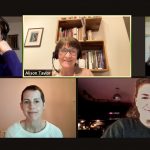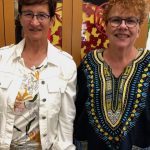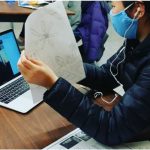By Lauryn Rohde
“Be the change you want to see in this world.” (Gandhi)
These words stand out on the very first pages of “Everything Present in the Seed” (EPitS), a community leadership training guide written by Lucy Alderson and Kathy Coyne and edited by Betsy Alkenbrack. And even after just a short conversation with Lucy and Betsy it’s easy to tell that the quote isn’t just for show—it’s a mantra they live by. Not only have they invested their lives into improving the communities that they are a part of, EPitS acts as a guide to help others do the same.
The manual is designed for community leaders – whether they be non profit staff, volunteers, or students, it’s aimed to reach the people who dedicate their energy to creating vibrant, caring communities. The guide provides practical ideas and exercises to support volunteers in their journey of community involvement. Authors use a “social change spiral” to describe community development. They start with the ideas and experiences, then work together to analyze those experiences and identify actions they can take together. Finally, they note the importance of the reflection process to understand what has been learned and what still needs to be tackled.
Let’s look at an example. The EPitS chapter “What is community development” starts off by defining inclusive social change. While acknowledging that while there are many different ways to achieve community development, the guiding principles are the same almost anywhere. After fleshing out key ideas and introducing topics such as gentrification and inclusivity, the book provides discussion points to encourage further understanding.
It asks readers questions like: “What development in your community did you not appreciate? And, Who has the power to make things happen?” It ends by encouraging readers to take action against developments readers feel are negative, for example, by writing a letter to decision-makers. The book also covers many practical topics needed for community involvement: writing funding proposals, gaining computer skills, and planning projects.
Realistically, the book covers way too much material for me to be able to give you an accurate Sparknotes version in one blog post. But I can tell you what became clear to me throughout the book, which is that EPitS represents an intersection of many key issues Lucy and Betsy have spent their lives fighting for. It encourages lifelong learning, while giving power to community members by providing them with the skills and understandings required to both challenge the status quo and contribute to community in meaningful ways. EPitS has forged a pathway for the authors’ influence to reach far beyond the community organizations they’re directly involved in, creating a butterfly effect of positive and meaningful community involvement.
In the spirit of free and open access to materials, EPitS is distributed without cost through Decoda Literacy Solutions, a province-wide literacy organization in BC. Get your copy at: https://www.decoda.ca/resources/rsc-adults/rsc-adults-community-literacy/everything-present-in-the-seed-community-leadership-training/





